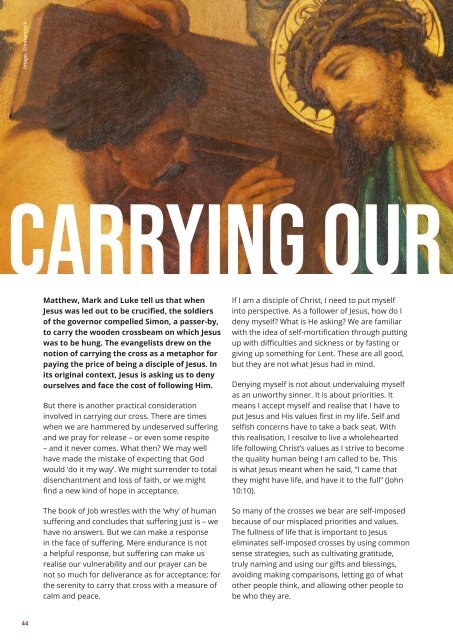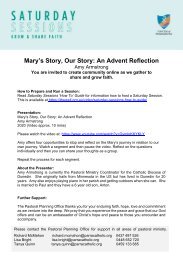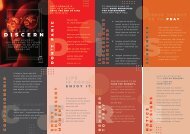Catholic Outlook Magazine | Lent & Easter | 2024 Issue
Create successful ePaper yourself
Turn your PDF publications into a flip-book with our unique Google optimized e-Paper software.
Image: Shutterstock<br />
CARRYING OUR<br />
Matthew, Mark and Luke tell us that when<br />
Jesus was led out to be crucified, the soldiers<br />
of the governor compelled Simon, a passer-by,<br />
to carry the wooden crossbeam on which Jesus<br />
was to be hung. The evangelists drew on the<br />
notion of carrying the cross as a metaphor for<br />
paying the price of being a disciple of Jesus. In<br />
its original context, Jesus is asking us to deny<br />
ourselves and face the cost of following Him.<br />
But there is another practical consideration<br />
involved in carrying our cross. There are times<br />
when we are hammered by undeserved suffering<br />
and we pray for release – or even some respite<br />
– and it never comes. What then? We may well<br />
have made the mistake of expecting that God<br />
would ‘do it my way’. We might surrender to total<br />
disenchantment and loss of faith, or we might<br />
find a new kind of hope in acceptance.<br />
The book of Job wrestles with the ‘why’ of human<br />
suffering and concludes that suffering just is – we<br />
have no answers. But we can make a response<br />
in the face of suffering. Mere endurance is not<br />
a helpful response, but suffering can make us<br />
realise our vulnerability and our prayer can be<br />
not so much for deliverance as for acceptance; for<br />
the serenity to carry that cross with a measure of<br />
calm and peace.<br />
If I am a disciple of Christ, I need to put myself<br />
into perspective. As a follower of Jesus, how do I<br />
deny myself? What is He asking? We are familiar<br />
with the idea of self-mortification through putting<br />
up with difficulties and sickness or by fasting or<br />
giving up something for <strong>Lent</strong>. These are all good,<br />
but they are not what Jesus had in mind.<br />
Denying myself is not about undervaluing myself<br />
as an unworthy sinner. It is about priorities. It<br />
means I accept myself and realise that I have to<br />
put Jesus and His values first in my life. Self and<br />
selfish concerns have to take a back seat. With<br />
this realisation, I resolve to live a wholehearted<br />
life following Christ’s values as I strive to become<br />
the quality human being I am called to be. This<br />
is what Jesus meant when he said, “I came that<br />
they might have life, and have it to the full” (John<br />
10:10).<br />
So many of the crosses we bear are self-imposed<br />
because of our misplaced priorities and values.<br />
The fullness of life that is important to Jesus<br />
eliminates self-imposed crosses by using common<br />
sense strategies, such as cultivating gratitude,<br />
truly naming and using our gifts and blessings,<br />
avoiding making comparisons, letting go of what<br />
other people think, and allowing other people to<br />
be who they are.<br />
44

















